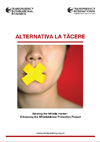 Alternative to silence - full content
Alternative to silence - full content
Most of the ten European countries included in Transparency International's latest Intelligence Intelligence (TI) study do not have proper laws to protect whistleblowers, people who often take risks and are faced with potential sanctions for flagging offenses, including of corruption. In addition to the legislative voter of most of the countries participating in this study, there is an ambivalent or even negative attitude towards whistleblowers in Bulgaria, the Czech Republic, Estonia, Hungary, Ireland, Italy, Latvia, Lithuania, Romania and Slovakia.
The importance and value of integrity alerts in the fight against corruption are increasingly recognized. Through international conventions, the signatory countries are committed to implementing specific legislation and more and more governments, companies and non-profit organizations are willing to put into place the appropriate regulations. The legal framework may be essential in support of this practice, provided that it ensures full protection of the whistleblower and also a proper and independent follow-up of this process, following the referral. Since integrity alerts are mostly people inside the organization, which are the first to detect a violation of the law, internal functional integrity warning systems provide effective risk management for public institutions, private companies and non- advantage.
"Insufficient protection may result in unlawful violations of the law," says Miklos Marschall, Director of IT and Central Asia. "Whistleblowers must be defended by reprisals and must be able to count on effective mechanisms to investigate allegations."
The TI study, Alternative to Silence: The protection of whistleblowers in ten European countries, shows that none of the countries under review have a dedicated legal framework to protect whistleblowers, except for Romania. Of the ten studied states, eight are from the former Soviet bloc and suffer the negative connotations associated with the concept of whistleblower, which is seen as synonymous with informant, traitor or founder.
Concerning Romania, since 2004, public sector whistleblowers are protected by a comprehensive law that takes precedence in case of conflict with other legislative provisions. However, the number of warning cases in the public interest in Romania is still low, which is largely due to the socio-cultural context. A public interest alert is not familiar to the public or is not sufficiently appreciated. Civil society has attempted several approaches to improving law enforcement, but the promotion of public interest warning mechanisms still requires a concentrated effort. Weaknesses remain at the level of internal application in institutions or at the level of media coverage and public awareness of the public interest warning. Regarding the legislative framework, it is recommended to extend the coverage of the personnel protected by Law no. 571/2004 on the protection of staff in public authorities, public institutions and other units reporting offenses against the law of the entire public sector, as well as civil servants in public utilities and courts. The law must also regulate the legal liability and sanctions of those who violate the law (and law enforcement) and cases where minor misdemeanors are sanctioned contrary to common practice.
Consideration should also be given to the possibility of extending similar legal mechanisms to protect whistleblowers in the private sector, with a detailed study to identify best corporate ethical practices, including an assessment of the most vulnerable sectors and operations in the regards the risk of corruption. The list of frequent work disputes should be the starting point for determining the necessary legislative provisions for improving the working relations framework. This should be followed by a comprehensive review of legislation to identify the core points of labor relations that pose major threats to integrity.
Transparency International Romania
Contact:
Victor Alistar - Executive Director, Transparency International Romania
